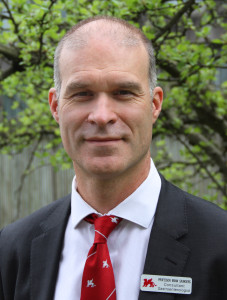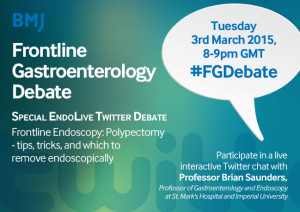After the great success of the #FGDebate with Professor Mark Pritchard, we are delighted to announce our next #FGDebate will be lead by Professor Brian Saunders (@MarkSdoc1), Consultant Gastroenterologist, St. Mark’s Hospital and Adjunct Professor of Endoscopy Imperial College for the ‘Special EndoLive Twitter Debate’, on Tuesday 3rd March 2015, at 8-9pm GMT and will discuss, ‘Frontline Endoscopy: Polypectomy – tips, tricks, and which to remove endoscopically’.
Professor Saunders is a Consultant Gastroenterologist and Specialist Endoscopist at St. Mark’s Hospital, a tertiary referral centre for complex intestinal problems. He is Chairman of Gastroenterology at St. Mark’s Hospital, Director of Bowel Cancer Screening for North West London and Lead Clinician for both the Wolfson Unit for Endoscopy and the Kennedy-Leigh Academic Endoscopy Centre. He is a founding member of the British Society of Gastroenterology, Endoscopy Research Committee and former Dean of the St. Mark’s Academic Institute.
His research interests include all aspects of colonoscopic practice and particularly practical aspects of polyp resection and bowel cancer prevention. He is the co-applicant on several major grants, has published >150 peer-reviewed articles, written multiple book chapters and is co-editor of the book, “Practical Gastrointestinal Endoscopy”. Over the last 15 years he has demonstrated colonoscopy techniques and has lectured at most of the major endoscopy and gastroenterology meetings throughout the World.

In advance of this EndoLive Special #FGdebate, Professor Saunders says:
“Colonoscopic polypectomy has become the most commonly performed therapeutic procedure in gastroenterology practice. Used correctly it is a powerful tool in cancer prevention and can significantly reduce the morbidity from traditional surgery. Training in polypectomy is highly variable and poor technique may lead to incomplete polyp resections and the risk of interval cancers. Complete and safe polyp resection requires an understanding of basic principles of anatomy, polyp pathology, the application of diathermy and the recognition and management of complications. Although most polyps are small and easily managed with tried and tested snare techniques, larger lesions can be more challenging and potentially hazardous to remove with the endoscope. In recent years patient-centred, multidisciplinary meetings (Polyp MDT’s) have been helpful in tailoring therapeutic strategy. Options for resection include piecemeal EMR, ESD or hybrid techniques such as laparoscopically assisted polypectomy or trans-anal submucosal endoscopic resection (TASER). This Twitter debate aims to share key guidance on the approach to lesion recognition, appropriate selection and delivery of polypectomy techniques and prevention and management of polypectomy complications. A unique feature will be the opportunity to upload polyp images for discussion and debate.”
Join on 3rd March 2015 at 8-9pm GMT for this exciting #FGDebate prior to EndoLive UK. If you have not registered for EndoLive UK please register NOW at http://www.endolive-uk.org.uk
NOTE: During the #FGDebate Professor Saunders will be answering questions on polyps and polypectomies and would be happy to review photos of polyps from those joining the debate. For those uploading the photos they must NOT contain patient identification details on them to maintain ABSOLUTE confidentiality.
